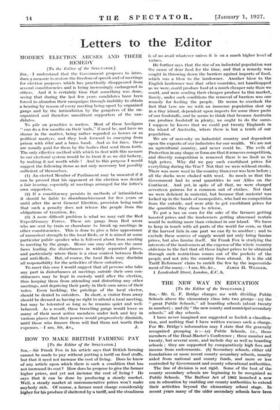HOW TO MAKE BRITISH FARMING PAY
[To the Editor of the SPECTATOR.]
Sin,—Sir Frank Fox in his article says that British farming cannot be made to pay without putting a tariff on food stuffs, but that it need not increase the cost of living. Does he know of any article upon which there is such a condition that has not increased its cost? How does he propose to give the farmer higher prices, and yet not increase the cost of, living ? He
says that it can be done by producing a steady market. Well, a steady market at unremunerative prices won't make anybody rich. Of course, a farmer must charge considerably higher for his produce if sheltered by a tariff, and the steadiness
is of no avail whatever unless it is on a much higher level of values.
He further says that the rise of an industrial population was the cause of dear food for the time, and that a remedy was sought in throwing down the barriers against imports of food, which was a blow to the landowner. Another blow to the English landowner was that other countries, not handicapped as we were, could produce food at a much cheaper rate than we could, and were sending their cheaper produce to this market. Surely, under such conditions the removal of barriers was one remedy for feeding the people. He seems to overlook the fact that here are we with an immense population shut up in a tiny island, dependent upon imports for some three parts of our foodstuffs, and he seems to think that because Australia can produce foodstuff in plenty, we ought to do the same. I suppose he knows that we could put twenty Englands in the island of Australia, where there is but a tenth of our population.
We are of necessity an industrial country and dependent upon the exports of our industries for our wealth. We are not an agricultural country, and never could be. The evils of Protection in any shape or form are that it removes competition, and directly competition is removed there is no limit as to high prices. Why did we pay such exorbitant prices for everything during the War ? Not that we were without stocks. There was more wool in the country than ever was here before ; all the docks were choked with wool. So much so that the Government had to send quantities to our Allies on the Continent. And yet, in spite of all that, we were charged seventeen guineas for a common suit of clothes. Not that we were deficient in material, but because that material was locked up in the hands of monopolists, who had no competition from the outside, and were able to get exorbitant prices for the quantities they chose to release.
To put a tax on corn for the sake of the farmers getting boosted prices and the landowners getting abnormal rentals would be nothing more than criminal in our island. We have to keep in touch with all parts of the world for corn, so that if the harvest fails in one part we can fly to another ; and to exclude these sources of supply would not only bring famine prices, but also famine. itself. Sir. Frank Fox is studying the interests of the landowners at the expense of the whole country oblivious to the fact that all these higher prices to be obtained through such restrictions comes out of the pockets of the people. and not into the country from abroad. It is the old Tariff Reformers' claim to enrich the few by the impoverish.
ment of the many.—I am, Sir, &e., JAMES H. WEAGER,, 1 Leadenhall Street, London, B.C. 3.


































 Previous page
Previous page